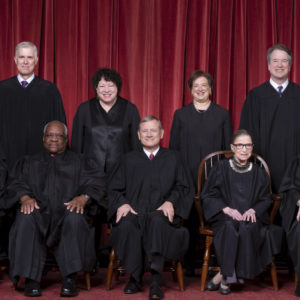As soon as President Trump announced he would fill the Supreme Court vacancy created by the death of Justice Ruth Bader Ginsburg, progressives warned that they would retaliate by enlarging the size of the Court.
With Republicans now likely to maintain control of the Senate, these threats may seem toothless. But they linger in the air as a warning: “If the Court doesn’t rule as we say, eventually we will fill it with justices who will.”
Of course, federal courts are not supposed to bend to the will of politicians, nor should they follow public opinion. Quite the contrary, our founders created an independent judiciary by design.
Judicial independence isn’t an abstract concept. It’s a rule that protects federal judges from outside interference so they can render decisions fairly and objectively on the basis of the law and the facts before them. Judicial independence is so important that Article III of the Constitution gives federal judges lifetime appointments to insulate them from political and social pressures.
To be sure, the Constitution does not dictate the number of Supreme Court justices. But since 1869, the Court has consisted of nine members (eight associate justices and one chief justice).
And, while there might be non-political reasons to alter the size of the judiciary, our founders certainly did not intend for politicians to tamper with the structure of a co-equal branch of government for political gain. Current efforts to pack the Court attempt to do just that.
They are a brazen attempt to turn our independent judiciary into a dependent and subordinate instrument of politicians — one that is impossible to square with the Constitution’s separation of powers principles.
Packing the Court would be truly revolutionary. It would change the fundamental structure of our government, depriving the judiciary of the ability to check unconstitutional government overreach.
After destroying our independent judiciary, what’s next? Will proponents of Court-packing seek to dismantle the Senate, claiming it’s “unfair” to the majority of Americans who live in larger states?
Perhaps not surprisingly, adding additional Supreme Court justices is a popular tool of authoritarian rulers. In 2004, for example, Venezuelan dictator Hugo Chavez added 12 new seats to his country’s Supreme Court to ensure that the Venezuelan judiciary would not stand in the way of his attempts to consolidate power and confiscate thousands of private businesses.
The expanded Venezuelan court then stood by as Chavez and his successor, Nicolas Maduro, imposed socialism and deprived citizens of fundamental rights. In 2017, the Venezuelan high court declared the legislature illegitimate and transferred all lawmaking power to itself. When riots ensued, the packed court backed down. But it has continued to allow Maduro to rule without consulting the legislature.
There was a time when Americans of both parties opposed Court-packing schemes. When President Franklin D. Roosevelt attempted to pack the Court in 1937, the Democratic-controlled Senate Judiciary Committee called his plan a “dangerous abandonment of constitutional principle” and an “invasion of judicial power.” Opposition was so fierce that Roosevelt had to back down.
Although some far-left Democrats like Alexandria Ocasio-Cortez have favored Court-packing for several years, as recently as 2019, Justice Ginsburg herself expressed grave reservations about changing the number of justices on the Court. In an interview with NPR, Ginsburg warned that changing the number of justices would politicize the Court, threaten its independence, and undermine its legitimacy.
But Justice Ginsburg has died, and so too has most of the Democratic opposition to Court-packing. When asked about enlarging the size of the Court in the aftermath of Ginsburg’s death, Senator Minority Leader Chuck Schumer said, “everything is on the table.” And a number of Democrats in Congress have explicitly said they would expand the Court as payback for the confirmation of Justice Barrett.
For his part, Joe Biden says that he will convene a “commission” to study the issue. The purpose of such a commission is obvious: to make clear to the current justices that they are on thin ice — that if they dare rule against the wishes of the political branches, retribution awaits them.
If that isn’t a threat to the rule of law, I don’t know what is.

